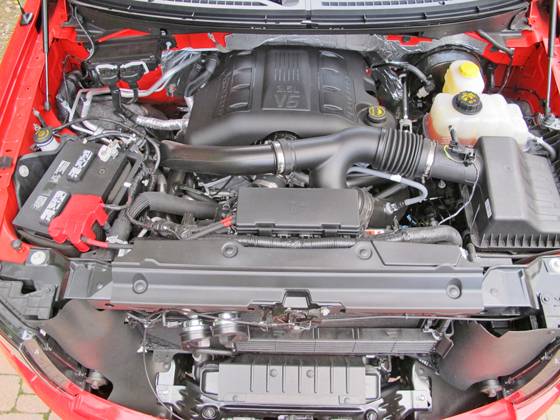Induction Service Cleaners Can Damage Ford EcoBoost Engines

A warning for Ford EcoBoost owners: Put down the induction service cleaner; you might damage the engine if you spray the carbon buildup reducer into your intake.
A Ford service technician posted two videos earlier this year addressing the issue. Essentially he discovered that aging EcoBoost engines are experiencing misfires caused by carbon buildup on the intake valves. When he called Ford for a fix, he was told that Ford is recommending changing the cylinder heads because forced-induction service (sometimes accomplished by spraying a special cleaning fluid into the intake) will ruin the turbos.
Mike Levine, Ford’s truck communications manager, concurs. He said a forced-induction service is “not part of the official maintenance guidelines for EcoBoost engines.”
How Does Carbon Buildup Happen?
Over time, direct-injection engines like the EcoBoost can run extraordinarily rich at startup, especially in cold weather. Combine this richness with a truck making a short commute — meaning the engine doesn’t reach its optimal temperature — and carbon deposits begin to attach themselves to the cylinders, including valves and heads. Eventually these carbon buildups rob the engine of performance and fuel economy.
For naturally aspirated engines, carbon deposits can be prevented by following the manufacturer’s recommended service interval for air filters and spark plugs, and doing periodic injector clearings.
If these don’t prevent the carbon buildup, or if you really want to clean your engine, a forced-induction service is normally the way to go — unless you have a Ford EcoBoost engine.
What Is Forced-Induction Service?
Forced-induction service involves spraying chemicals into the engine to clean it out. There are pros and cons to using these chemicals. Benefits may include a smoother idle, better fuel economy and more power (although these improvements could also be due to regular maintenance of fuel filters and spark plugs). The downside to using them includes harming the engine through improper use, and the facts that amateurs should not use them and automakers don’t recommend them. If used incorrectly, these chemicals cause problems like catalytic converter failure, carbon dioxide sensor failure, damaged actuators inside the air-intake manifold and other issues.
Other solutions used by dealers and mechanics include things such as TerraClean. This is a decarbonizing machine that connects to the fuel system and sprays a chemical mixture that decarbonizes the engine. It is used in many automotive shops.
Why Don’t They Work for Ford’s EcoBoost Engine?
We talked with an automotive expert who confirmed what the video explains: Forced-induction chemicals cause a reaction that increases the temperature around the turbochargers leading to premature failure. A single turbo can cost thousands to replace.
The reality is that while the new EcoBoost is an impressive engine, carbon buildup will happen and for now, the only fix seems to be replacing the cylinder heads.
Cars.com’s Editorial department is your source for automotive news and reviews. In line with Cars.com’s long-standing ethics policy, editors and reviewers don’t accept gifts or free trips from automakers. The Editorial department is independent of Cars.com’s advertising, sales and sponsored content departments.
Featured stories




